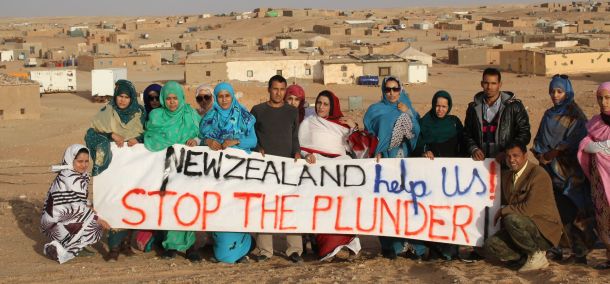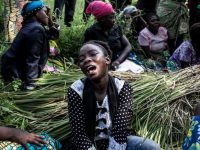Khartoum suffers from a fierce war between the Rapid Support Forces and the Sudanese army,…

Legal Case in New Zealand Against Imported Phosphates from the Occupied Territories of Western Sahara
The National Sahrawi Liberation Movement (the Polisario Front) initiated legal actions to stop illegal imports of phosphate rock from occupied Western Sahara to New Zealand. The Polisario Front filed for judicial review of certain investment decisions made by the New Zealand Guardians of Superannuation Fund.
In a press release, Polisario Front Representation stated, “these decisions support Morocco’s ongoing illegal occupation of Western Sahara, and the illegal extraction and exportation of Western Saharan phosphate, and are inconsistent with the Guardians’ statutory obligation to manage and administer the Fund in a manner consistent with avoiding prejudice to New Zealand’s reputation as a responsible member of the world community”.
The application for judicial review was filed by Kamal Fadel, the Polisario Front Representative in Australia and New Zealand.
“The Sahrawi people are determined to protect their natural resources with all available means. This legal action is a message to all who are involved in the exploitation of Sahrawi natural resources that they face legal action, reputational risks and investor withdrawal.” said Fadel.
This application follows a successful legal action by the Polisario Front abroad, including the seizure of a cargo of Western Saharan phosphate in 2017. The phosphate was in transit through South Africa en route to New Zealand. In this case, the High Court of South Africa ruled that the Sahrawi Government had ownership of the cargo and observed that Western Sahara was illegally occupied by Morocco by military means.
Western Sahara was largely occupied by Morocco in 1975 when Spain relinquished its colony in Spanish Sahara and allowed Morocco to take military control of the region. No country recognizes Morocco’s illegitimate administrative power of Western Sahara, and in 1975 the International Court of Justice observed that Morocco did not have historical ties to Western Sahara supporting a claim to sovereignty.
Today, Morocco occupies about 75% of Western Sahara and the Polisario Front controls the rest of the territory. The Polisario Front was recognized by the United Nations as the legitimate representative of the Sahrawi people of Western Sahara. Western Sahara is recognized as a non-self-governing territory by the United Nations, and based on international law, the Saharawi people have the right to self-determination and sovereignty over natural resources located in their territory.
Within the Moroccan-occupied area of Western Sahara, there is a phosphate mine at Bou Craa. Moroccan occupation allows phosphate to be mined at Bou Craa and exported through the Port of Laayoune (also within the occupied territory) by the company PhosBoucraa, owned by the Moroccan government.
The annual extraction and export of phosphates are an incentive for Morocco to continue its illegal occupation of Western Sahara and to direct an economy in extension of its occupation of the territory. Moreover, it is a pretext for Morocco to continue delaying a referendum under the aegis of the United Nations that would allow Western Sahara to assert its independent sovereignty.
Over the last decade, numerous companies around the world have ceased imports of phosphate from Western Sahara based on ethical values. Countries such as Australia, Canada and the United States no longer import phosphate from the territory. However, the New Zealand companies Ballance Agri-Nutrients Limited (Ballance) and Ravensdown Limited (Ravensdown) continue to buy and import phosphate from Western Sahara and through them, New Zealand is the only country in the western world to import phosphate from the occupied territory.
The New Zealand Superannuation Fund is a New Zealand Government savings vehicle established to help pre-fund the cost of universal superannuation, or pension, in New Zealand. Its estimated value is over $44.5 billion. The Fund is managed and administered by the Guardians of the New Zealand Superannuation Fund, a Crown Entity. The Guardians of the Fund have a statutory obligation to manage and administer the Fund in a manner consistent with avoiding prejudice to New Zealand’s reputation as a responsible member of the world community.
The Fund invests in occupied Western Sahara through farms that use Saharawi phosphate supplied by Balance and in interests in companies operating in the occupied territory. Since 2012, the international counterparts of the Guardians, including the Norwegian Government Pension Fund, National Employment Savings Trust (United Kingdom), APG (Netherlands), AP Funds (Sweden), FDC (Luxembourg) and BMO Global Asset Management, have excluded companies that extract resources from Western Sahara for ethical reasons.
The Polisario Front says that the Fund’s continuing investments prejudice New Zealand’s reputation as a responsible member of the world community and it is initiating orders requesting that the Guardians reconsider the Fund’s investments in Western Sahara.
From an interview with Western Sahara activist Tecber Ahmed Saleh for Green left.
Tecber Ahmed Saleh is a prominent Western Sahara human rights activist who was born in a refugee camp in Algeria where her family has lived for over 40 years.





